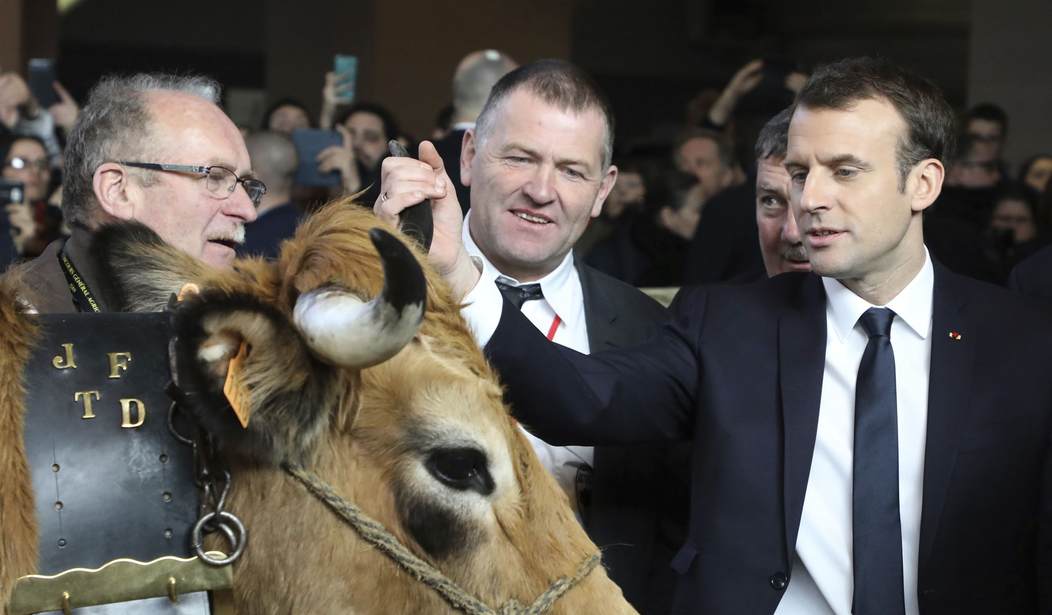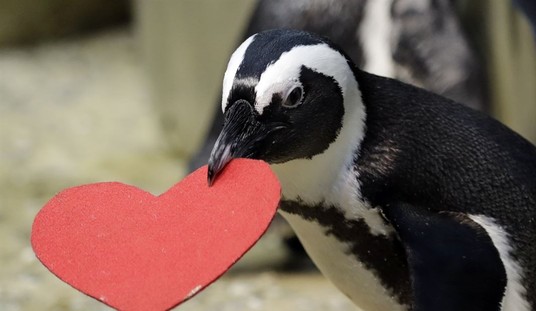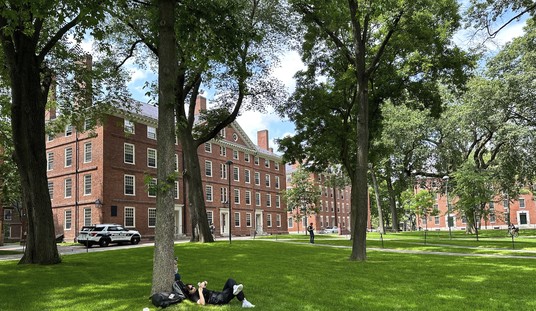For a class of pampered elites who loves their agriculture neat, tidy, highly enforced, and regulated damn near out of existence, the Brahmins of Brussels sure seem to be clueless when it comes to understanding precisely what is involved in "farming."
Not just dirt, tractors, cow farts, fertilizer, pesticides, and seeds.
Oh, no, no, no. There are long, thankless hours that often wind up being fruitless as well if Mother Nature, whom even the European Union has yet to tame, runs quirkily difficult with freezes, floods, or droughts.
None of which the EU expresses much sympathy for farmers when affected by one or all of the various calamities inherent in the pursuit of growing things, be they animal, vegetable, or fruit.
Unelected head of the EU, Ursula von der Leyen: "I know that [farmers] are worried about the future of agriculture, and about their future as farmers, but they also know that agriculture needs to move to a more sustainable model of production so that their farms remain profitable… pic.twitter.com/ZQ0zDflDHG
— Wide Awake Media (@wideawake_media) April 18, 2024
The EU enforces some of the strictest farm regulations on the planet, covering everything from tractor fuel to fertilizers allowed and traceability of every single product's origin that comes to market. It is labor intensive and expensive long before that apple or cheese wheel ever makes it to a Lidl cold case.
All in the name of sustainability and earth-friendliness. They are stringently enforced and literally cover every aspect of farming life.
...World food production needs to double by 2050 to cater for population growth and evolving food habits. It faces the impacts of climate change on biodiversity, soil and water quality, and the demands of the global marketplace.
EU farm policy has changed considerably in recent decades to help farmers face these challenges and respond to peoples' changing attitudes and expectations. EU agricultural policy covers a wide range of areas, including food quality, traceability, trade and promotion of EU farm products. The EU financially supports its farmers and encourages sustainable and eco-friendly practices, while also investing in the development of rural areas.
EU institutions collaborate on food and farming policy-making, implementing, monitoring and evaluating it. National and local authorities implement the laws agreed at EU level. Through the EU budget, funds are made available to member states in accordance to rules set at EU level. The EU also monitors how laws are applied, how effective they are, and coordinates amendments.
Every EU farmer at least has the satisfaction of knowing that whatever he sacrifices to grow, the other fellow's produce from the other EU country on the shelf competing with his has had to deal with the exact same mind-numbing, backbreaking, bankrupting requirements to sell products. The fact that it's a pretty level playing field takes some of the sting out of the grind.
That's about to change, possibly in significant fashion, and French farmers are the ones making the most noise at the moment.
For 25 years, the European Union has been trying to work a trade deal with a Latin/South American block of countries - the so-called "Mercosur" block consists of Brazil, Argentina, Uruguay, Paraguay, and Bolivia - in order to open up another market for their exports. Part of the stumbling blocks to any trade agreement between the two groups has been the EU's tendency to dictate climate-related terms recipient countries have to adhere to as far as deforestation, carbon neutral requirements, etc. Understandably, rising countries are tired of having their progress impeded by "developed" countries that already have exploited their own national natural resources and resent being told they are not allowed to do the same with their abundant riches if they want to trade with Europe.
Push has come to shove, and the EU is close to compromise on many of their demands - either delaying them a year or ignoring them altogether - and the chances of a Mercosur/EU trade deal being finalized this winter look good.
The European Union expects to close the trade agreement with South American bloc Mercosur by the end of the year, the EU commissioner for crisis management told Reuters late last week, although noting there were still differences to be solved.Janez Lenarcic, who is not directly participating in the talks with Mercosur, acknowledged that a new EU law banning the import of products linked to the destruction of the world's forests has been a sticking point, but said the law will not change - though its implementation is on the verge of being put off for another year.
Europeans farmers, on the other hand, are fixin' to go to the mattresses over the deal, and French farmers have already taken the manure to the maisons of the government.
These are French farmers spraying manure on government offices in protest of high taxes! pic.twitter.com/kx0jmL5FSu
— ℚ𝕠𝕫 (@Qoztwt) November 17, 2024
The deal is le pew for long-suffering European agriculture.
😮 French Farmers Block Roads in Protest at EU Trade Deal pic.twitter.com/c35koxtvNe
— 地方都市の社会科教師 (@aiyarah0422) November 18, 2024
What this EU trade deal will do is allow South American agricultural imports into Europe that are grown with none of the restrictions that European farmers have to labor under.
French President Emmanuel Macron is furiously lobbying to spike the deal, working on leaders in both SA and Brussels. But he seems to be a one-off as far as countries go.
...“We do not believe in the pre-agreement as it was negotiated,” he [Macron] added, arguing that the deal was now outdated in Europe and would be negative for Argentina.
According to Macron, the Mercosur trade deal would also be unfair to European and French farmers.
“We cannot ask our farmers in Europe and France, to change their practices, to stop using certain phytosanitary [plant health] products,” he said.
“We cannot ask them to maintain high-quality agriculture while simultaneously opening our market to massive imports of products that do not meet the same standards.”
But he seems to be a one-off as far as leadership goes.
...France’s efforts to block the trade agreement saw Prime Minister Michel Barnier travel to Brussels on November 13 to urge European Commission President Ursula von der Leyen to delay the deal’s signing.
Despite Paris’ vocal opposition and ongoing protests from French farmers, Paris has appeared isolated in its stance and, lacking the necessary blocking minority to veto the agreement outright, its ability to derail the deal seems limited.
...The Mercosur deal aims to eliminate nearly all customs duties between the EU and the South American bloc.
If finalized and implemented, it could become the EU’s largest trade agreement to date, encompassing a market of some 780 million people.
Besides befouling government buildings, organized protests are already shutting down highways, and protestors are marching in large numbers.
🚨🇫🇷FRENCH FARMERS PROTEST EU FREE TRADE AGREEMENT DEAL WITH SOUTH AMERICAN NATIONS
— Mario Nawfal (@MarioNawfal) November 18, 2024
French farmers hit the streets opposing a potential EU-Mercosur trade deal, warning it could trigger an agricultural crisis and lead to unfair competition.
The demonstrations coincide with… pic.twitter.com/IrFLrOY0LE
More of the same is expected as the situation for many French farmers is already desperate.
...However, the mood in France has soured further, after rain-hit harvests, livestock disease outbreaks and a parliamentary election that delayed measures promised to defuse the previous protests, which saw farmers block highways for weeks."We have the same demands as in January, nothing has changed," Armelle Fraiture said on her dairy farm north of Paris. "We must make the government understand that enough is enough."As farmers face cheaper imports, burdensome regulations and meagre incomes, a Mercosur deal would represent a bitter "cherry on the cake", Arnaud Rousseau, head of France's main farmers' union, the FNSEA, told BFM TV on Sunday.Tens of thousands of farms in France, the EU's biggest agricultural producer, were in financial trouble, he said.
Cooler, more logical heads are trying to work out a compromise.
Let the farmers end the EU.
— Sieger (@InvadersGoHome) November 18, 2024
But what Brussels wants, Brussels will bull ahead until it gets it.
And everyone else regrets it.







Join the conversation as a VIP Member